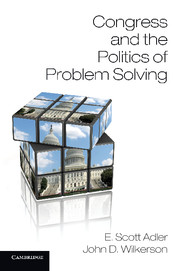7 - Agenda Setting in a Problem-Solving Legislature
Published online by Cambridge University Press: 05 January 2013
Summary
Most bills that become law do so after a fight for space in the calendar rather than a fight with an opposition of a more direct kind.
Arthur Bentley (1908, 493)Why do some lawmakers sponsor more successful bills than others? In this chapter, we argue that a bill’s issue content is crucial to appreciating its progress. Certain issues must be addressed. Expiring programs must be renewed and Congress must respond to external events. Scarce agenda space means that attention to these “compulsory” issues supplants opportunities to take up other matters (Walker 1977). More often than is generally appreciated, successful bill sponsorship is less suggestive of a sponsor’s entrepreneurial skills, and more indicative of a policy caretaking process.
For nearly fifty years, the common metric political scientists have used to assess legislative effectiveness has been the progress of the bills a lawmaker sponsors. Most of these studies assume that a bill’s progress is indicative of the ability of individual lawmakers to advance their policy priorities. William Anderson and colleagues nicely capture this line of thought when they ask: “What ‘remarkable skills’ allow some legislators to guide their bills successfully out of committee, and perhaps out of the House, while others are routinely met with legislative defeat?” (2003, 357).
Information
- Type
- Chapter
- Information
- Congress and the Politics of Problem Solving , pp. 116 - 140Publisher: Cambridge University PressPrint publication year: 2013
Accessibility standard: Unknown
Why this information is here
This section outlines the accessibility features of this content - including support for screen readers, full keyboard navigation and high-contrast display options. This may not be relevant for you.Accessibility Information
- 1
- Cited by
